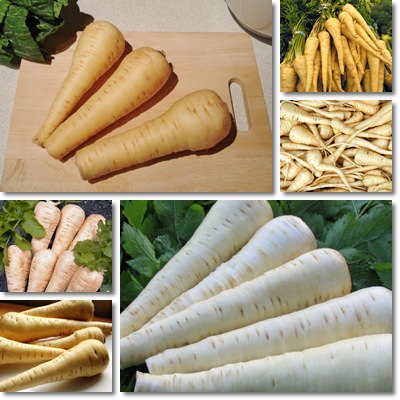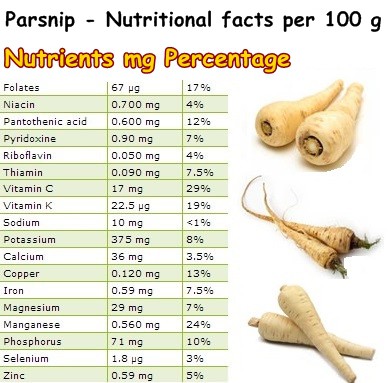A common garden vegetable, the parsnip is a wonderfully healthy combination of vitamins C and K, B vitamins, phosphorus, potassium and manganese. Its sweet flavor and creamy texture when cooked make it a delightful addition to any diet. Even more, the parsnip contains falcarinol and falcarindiol, two natural antioxidants with scientifically proven anticancer properties.
Animal studies performed at several reputable London universities suggest that falcarinol and falcarindiol may inhibit the progression of colon tumors and even prevent them from forming. Eaten fresh, the vegetables supplies important amounts of vitamin C for good immunity and reduced inflammation. If this isn’t a good enough reason to start eating parsnip, then read further and convince yourselves of just how healthy parsnips really are.

Parsnip nutrition facts and benefits
The parsnip (also known as Pastinaca sativa) is a root vegetable cultivated since ancient times. It is a close relative of the carrot, with which it shares its dashing good looks. Parsnips have an underground bulky main root, similar to a carrot, which represents the edible part of the vegetable. Due to similarities in appearance, it are often confused with the edible root of some parsley varieties. Very important: the stem and its beautiful green leaves are to be handled with great care because their sap causes very unpleasant rashes as well as skin discoloration, even burns.
The creamy-white root is safe for consumption, hence the reason parsnip is known as a root vegetable. Nutritionally speaking, it concentrates good amounts of numerous essential vitamins and dietary minerals as well as powerful antioxidants and phytochemicals with impressive health benefits. 100 g of raw parsnip provides 75 kcal, 18 g of carbohydrates, 4.8 g of sugar, 1.2 g of protein, 0.3 g of fat and 4.9 g of dietary fiber. All of these amounts speak to the nutritional value of parsnip and recommend it as a good addition to any varied and balanced diet.
While both the raw and cooked vegetable is healthy, the first preserves far more nutrients than the second because it also preserves heat-sensitive vitamins intact, adding to the benefits. Parsnips are a great source of dietary fiber, indigestible plant material that passes unchanged through the digestive system. The benefits of fiber are that it can help reduce cholesterol levels and treat constipation. Fiber prevents, to a certain extent, the intestinal absorption of fats from food, indirectly reducing LDL and total cholesterol levels.

In addition to this, a diet consisting of fiber-rich foods helps give bulk to and soften stools, regulates transit and relieves constipation. This further has benefits for hemorrhoids sufferers, helping manage symptoms and control the condition. But eating parsnip is not only a natural solution for relieving constipation, it can also help protect against colon cancer thanks to the fiber that regulates transit time and reduces the colon’s exposure to toxins in bowel movements.
Also, with 75 kcal/100 g and 4.9 g of fiber, parsnip is a great vegetable for losing weight. Relatively low in calories, but nutritious, it provides nourishment and helps preserve a steady and healthy weight. Moreover, fiber binds to fats in the intestinal tract, preventing their absorption to a certain extent, resulting in benefits such as weight loss.
As far as its anticancer properties are concerned, parsnip contains falcarinol, farcalindiol, methyl-falcarindiol and panaxydiol. These antioxidant natural substances are found in some members of the Apiaceae family like parsnip, carrots and parsley, and are potent anti-inflammatory, antifungal and anticancer agents which can protect against colon cancer and acute lymphoblastic leukemia. Ongoing research suggests that falcarinol and farcalindiol can efficiently inhibit tumor growth and have proved to be efficient against colon tumors especially.
As you can see in the nutritional table below, parsnips contains a variety of vitamins and minerals which all contribute to a great health. For instance, 100 g of the fresh root vegetable provides 29% of the recommended daily intake of vitamin C. Vitamin C stimulates the immune system, protects against bacterial infections, reduces inflammation, helps stimulate appetite, and increases iron absorption with benefits for anemia.
But remember: vitamin C is heat-sensitive so if you cook parsnip for too long, it loses most of its vitamin content. If you want to enjoy the wonderful health benefits vitamin C provides, try adding some fresh, grated parsnip to a salad you enjoy instead of cooking it. The vegetable is also a great source of vitamin K which promotes good blood coagulation and supports strong, healthy bones. Having enough vitamin K in your diet can help prevent easy bruising and nosebleeds, but should be avoided if you are being prescribed anticoagulant medication for blood clots.
Vitamin E, also found in parsnip in small amounts, is great for the skin and promotes physical and cognitive development in children. Other important nutrients in the root vegetable include the following B vitamins: folate, pantothenic acid, pyridoxine and thiamine. Parsnips provide a variety of dietary minerals such as potassium, copper, iron, magnesium, manganese and phosphorus. Potassium regulates blood pressure and body fluids while magnesium supports muscle activity and optimizes calcium absorption. Copper prevents premature graying and manganese has powerful antioxidant properties.

List of parsnip benefits
Considering its nutritional value and health effects, parsnip can provide the following benefits:
- Boosts energy levels as a result of a good B vitamin and high carbohydrate content.
- Has benefits for learning, memory and focus thanks to its B vitamins content.
- Stimulates immunity, reduces inflammation and helps produce more collagen thanks to vitamin C.
- Prevents easy bruising, nosebleeds and hemorrhaging as a result of its good vitamin K content.
- Has good amounts of phosphorus for strong bones and teeth.
- Contains pantothenic acid with benefits for dry skin, acne prevention and wound healing.
- Helps prevent birth defects as a result of its folic acid content.
- Has thiamine for preventing irregular heartbeat.
- Is an important source of fiber for relieving constipation and managing hemorrhoids.
- Helps with weight loss, including getting rid of belly fat.
Conclusion
Overall, parsnips are very healthy vegetables and can prove extremely versatile in the kitchen. They can be added to salads and casseroles or be made into mouth-watering pancakes or roasted alongside carrots as a wonderful side-dish. Because of their starchy content, parsnips help thicken soups. During winter frosts, the plant turns some of its starch into sugar; picking parsnips after winter frosts makes for sweeter-tasting roots. But overall, parsnip tastes bland, with a faint aromatic flavor to it reminiscent of fennel.
The parsnip is a biennial plant. If left to mature, it will develop small, yellow flowers which can be collected and used to plant an entire parsnip garden. Because they have a moderate caloric content (about 75 kcal/100 g of fresh root), extremely low fat content (less than 1%) and are about 80% water, parsnips can be consumed without fear of gaining weight. However, always remember that most fruits and vegetables have the highest concentration of phytochemicals in their skin. This is also true for parsnip, which is why it would be best to wash it carefully and cook it whole or, better yet, eat it raw.
